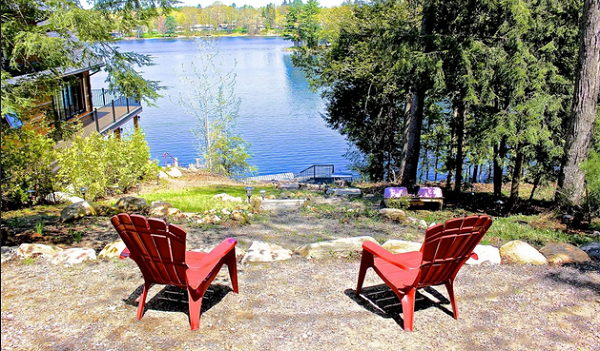The return of homebuyers set to push the prices of cottage country up
Cottage country homebuyers are ready to make a splash after many missed out on the party last year.
Ontario’s recreational property market is expected to rebound after a sluggish 2023, with the province leading the country in single-family home price appreciation at 8 per cent by the end of year, as sidelined buyers return to the market with the likely promise of interest rate cuts in the summer.
According to Royal LePage’s recreational property report released Wednesday, the national median single-family price forecast is set to increase by 5 per cent with all of Canada’s provincial recreational markets seeing an increase in single-family home prices in 2024.
But the increase in cottage prices and renewed interest among buyers won’t mean a return to the pandemic rush where properties were snapped up at an alarming rate.
“We find ourselves in a recovery market even though prices are still elevated considerably from where they were in 2019,” Phil Soper, CEO and president of Royal LePage, told the Star. “It’s more expensive for families looking to buy now than before the pandemic. But we won’t have the crazed cottage market we had in the pandemic.”
Despite a modest decrease over the past year, the national weighted median single-family home price remains 59 per cent above 2019 levels — Ontario’s single-family home price was $393,000 pre-pandemic and this year it’s forecast to reach $662,000.
Cottage country boomed during the early phases of the pandemic as city dwellers sought out more space and greener pastures during lockdown. A flock of end-users and investors shored up properties, leading prices to skyrocket in rural regions.
But once the Bank of Canada began hiking its key rate, carrying costs swelled on homeowners’ mortgages and some had to sell their recreational properties. But a looming interest rate cut could trigger a market revival, the report says.
“Demand has been building quietly on the sidelines,” said Soper. “Our regional experts tell us that buyer interest is steadily ramping up as the spring market approaches. With hybrid office and work-from-home business models being the norm now, many working people see the opportunity to make much better use of country properties.”
Majority of buyer demand comes from those aged 50 to 64, according to 57 per cent of experts surveyed for the report. There is a growing number of boomers in retirement age looking to sell their family homes in urban centres to move to cottages full-time, Soper said. They also have more capital and are in a better financial position to buy recreational property, compared to younger cohorts.
Investor demand will also look different this year compared to pre-pandemic times due to stricter short-term rental regulations.
Many investors jumped into the market when interest rates were at historic lows in 2020 and 2021, renting out properties on short-term rental platforms such as Airbnb and VRBO, year-round. But with rental regulations, the majority of investors are now “hybrid,” said Soper, meaning they live in the cottage part-time, renting it out when they’re not there. Some region’s regulations stipulate that the cottage owner must live on the premise, or live close by, while renting it out.
This has impacted sough-after locations such as Prince Edward County and Muskoka region.
“Strict short-term rental legislation has made it tougher for investors to break into the Muskoka market, making traditional cottage end-users the most dominant type of buyer in the area,” said John O’Rourke, broker, Royal LePage Lakes of Muskoka. “Typically, our average buyer is someone from the Greater Toronto and Hamilton Area with a connection to the region.”
Cottage country, like many real estate markets, is also facing an inventory shortage, which was exacerbated last year as interest rates climbed. It’s important to note that fewer investors will allow for some breathing room on the supply side.
“It mirrors what we’re seeing in city markets,” said Soper. “During economic uncertainty sellers and buyers take a wait-and-see approach. People don’t want to sell when there’s not much demand, they want to get the best price for their property. The uncertainty with interest rates encourages delay.”
And while there is an increase in condos being built in cottage country, there aren’t many new builds on the lakefront, putting pressure on supply, he added.
But an uptick in supply in Muskoka, and other regions, is expected over the coming months, with sellers following the ramp-up in buyer demand, O’Rourke said.
“Although Muskoka attracts wealthier buyers who are less impacted by interest rate changes, a drop in borrowing costs could still ramp up market activity later this year.”
This article was first reported by The Star













